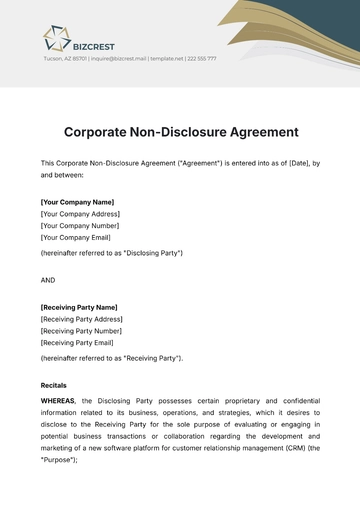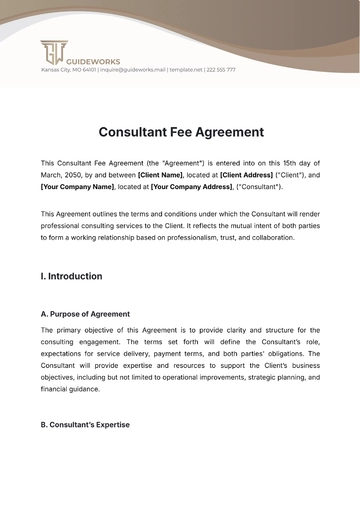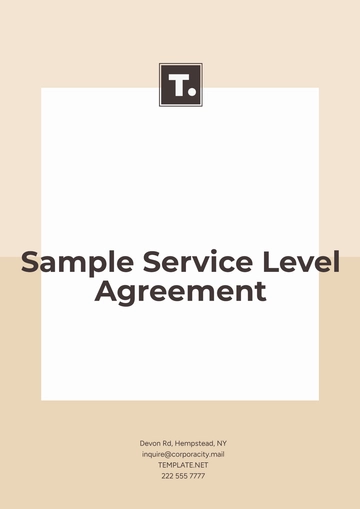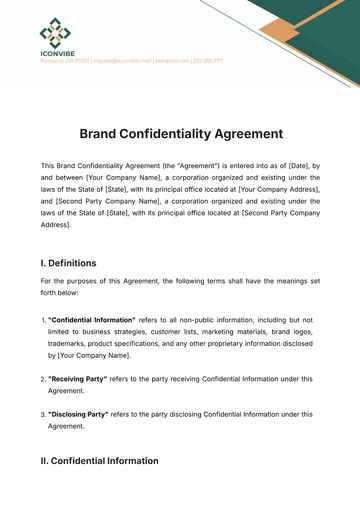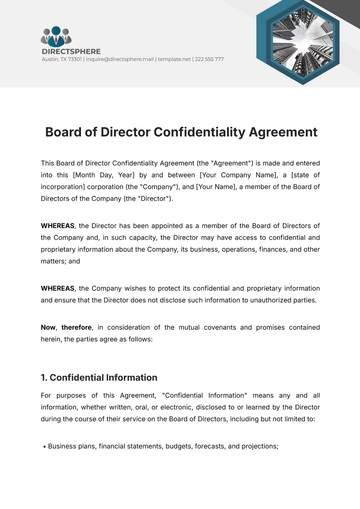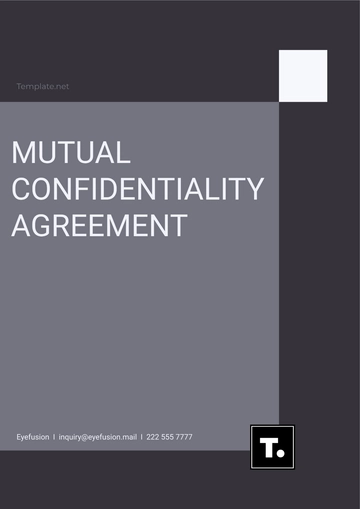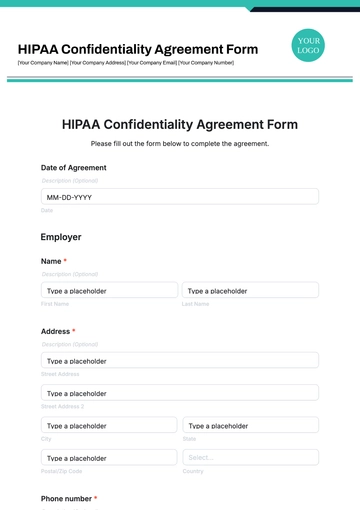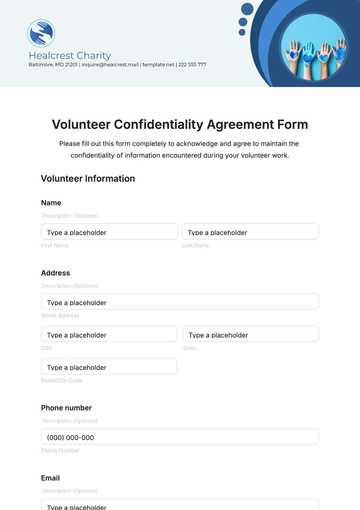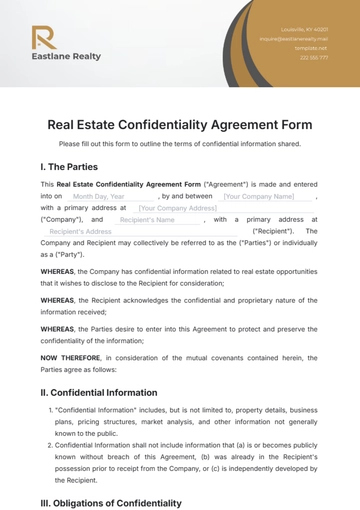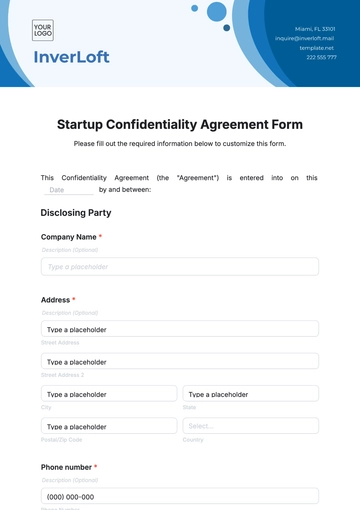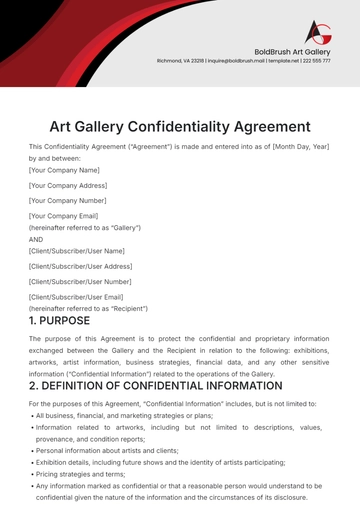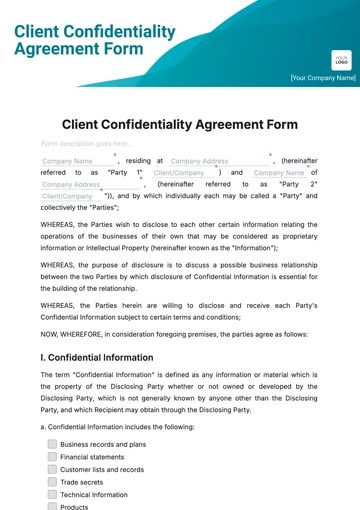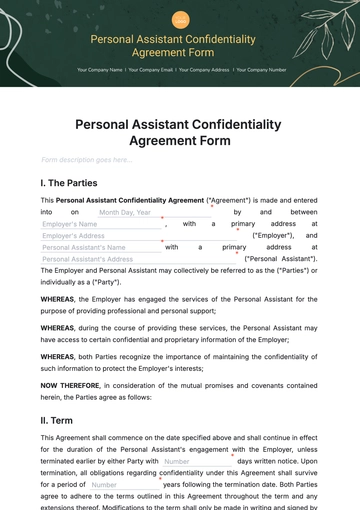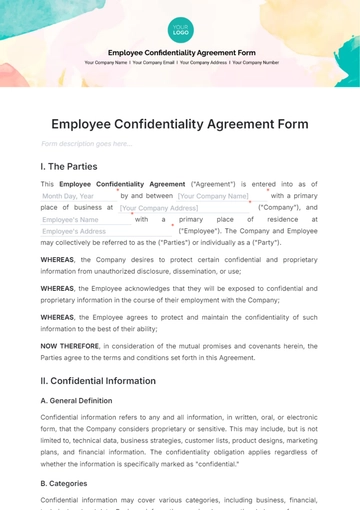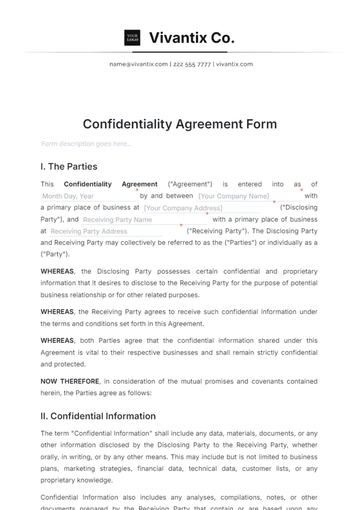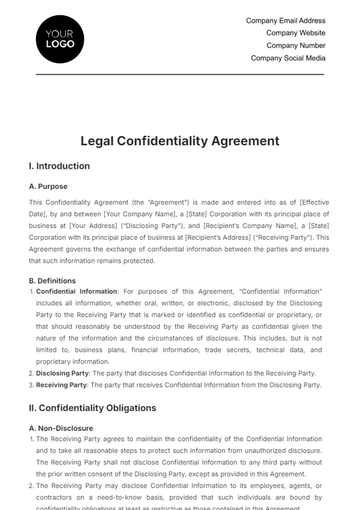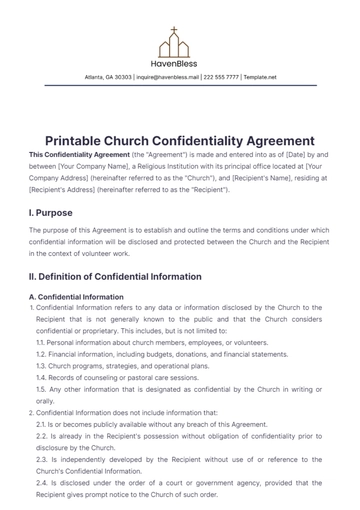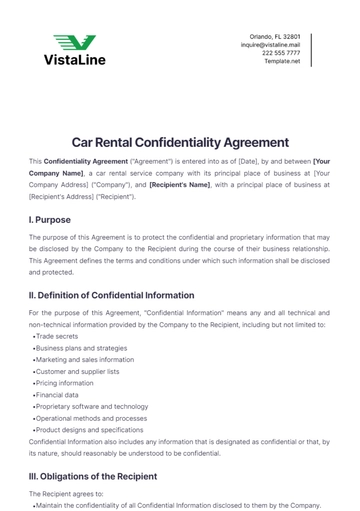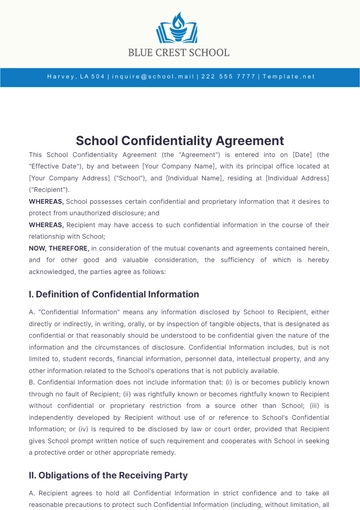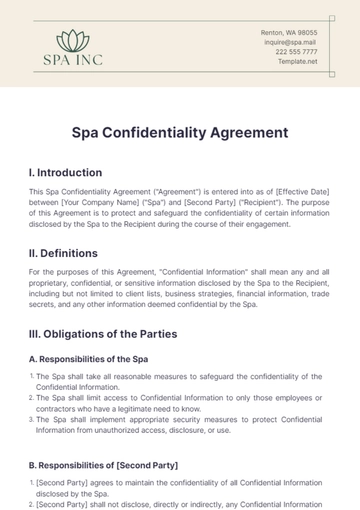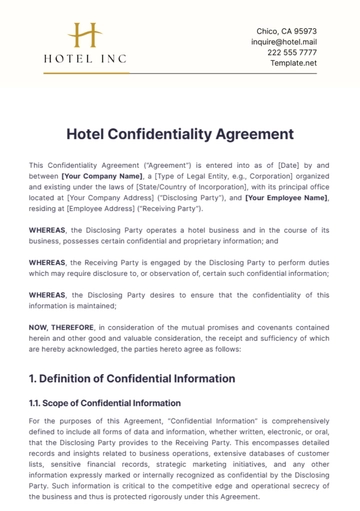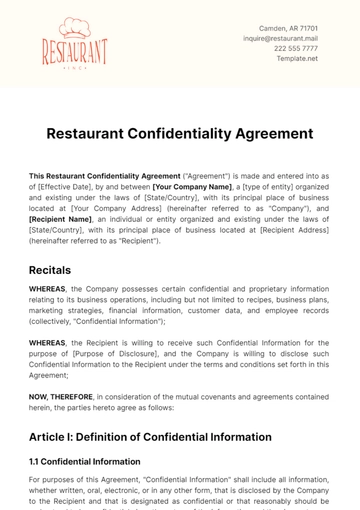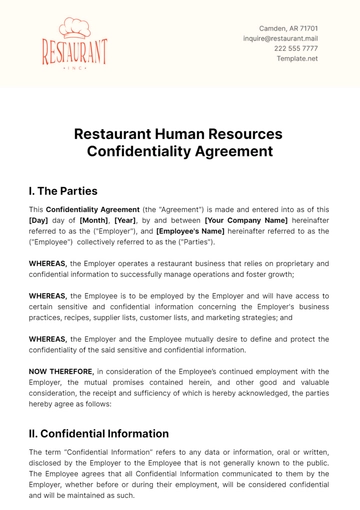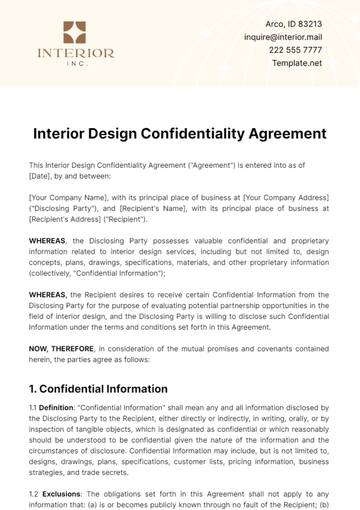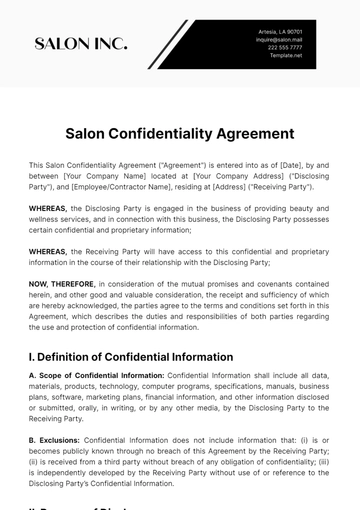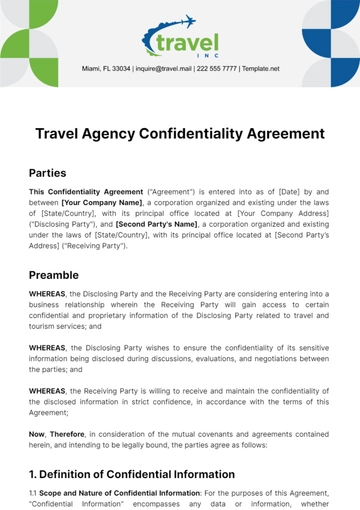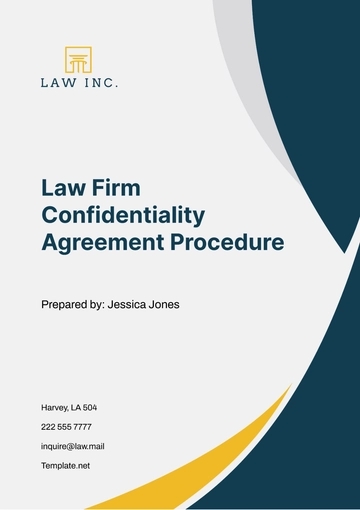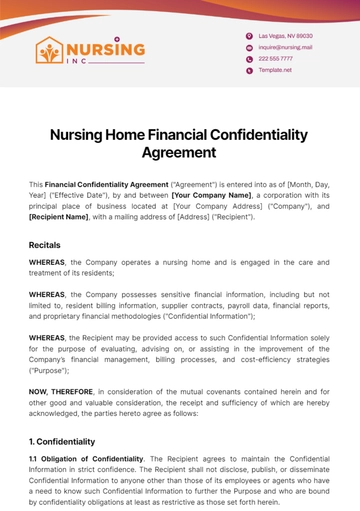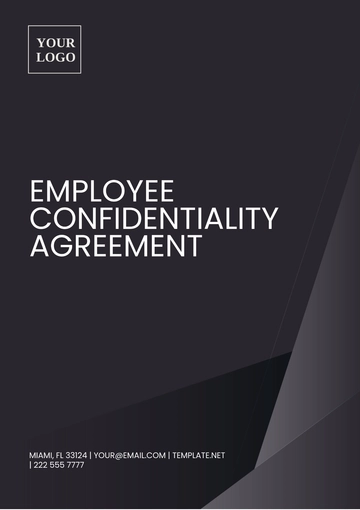Free Operations Project Confidentiality (NDA) Agreement
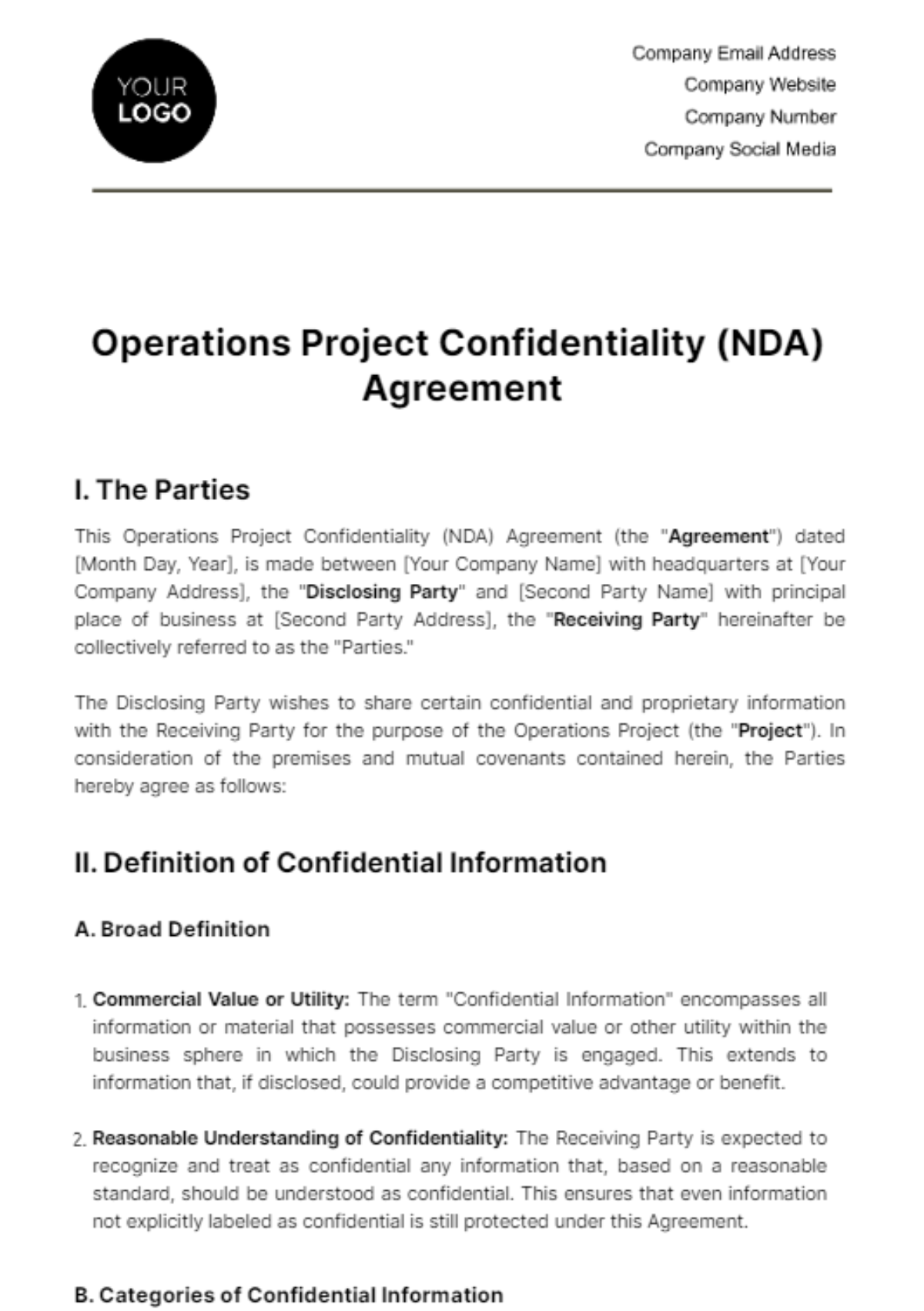
I. The Parties
This Operations Project Confidentiality (NDA) Agreement (the "Agreement") dated [Month Day, Year], is made between [Your Company Name] with headquarters at [Your Company Address], the "Disclosing Party" and [Second Party Name] with principal place of business at [Second Party Address], the "Receiving Party" hereinafter be collectively referred to as the "Parties."
The Disclosing Party wishes to share certain confidential and proprietary information with the Receiving Party for the purpose of the Operations Project (the "Project"). In consideration of the premises and mutual covenants contained herein, the Parties hereby agree as follows:
II. Definition of Confidential Information
A. Broad Definition
Commercial Value or Utility: The term "Confidential Information" encompasses all information or material that possesses commercial value or other utility within the business sphere in which the Disclosing Party is engaged. This extends to information that, if disclosed, could provide a competitive advantage or benefit.
Reasonable Understanding of Confidentiality: The Receiving Party is expected to recognize and treat as confidential any information that, based on a reasonable standard, should be understood as confidential. This ensures that even information not explicitly labeled as confidential is still protected under this Agreement.
B. Categories of Confidential Information
Technical Information or Data
This includes proprietary technical specifications, processes, and data integral to the Operations Project.
Business Strategies
Confidential business strategies encompass long-term plans, marketing approaches, and unique methodologies developed by the Disclosing Party.
Financial Information
Sensitive financial data such as budgets, forecasts, revenue figures, and expenditure details fall under this category.
Product Information
Information related to product development, designs, features, and any non-public details regarding products involved in the Operations Project.
Operations Guidelines
Guidelines, procedures, and internal operational methodologies crucial for the successful execution of the Operations Project.
Vendor Relationships
Confidential details about relationships with vendors, suppliers, or other external entities critical to the Operations Project.
III. Obligations of Receiving Party
A. Confidentiality Maintenance
Strict Confidence Obligation
The Receiving Party shall hold and maintain the Confidential Information in strict confidence, acknowledging its exclusive and sole benefit to the Disclosing Party.
Limitation on Access
The Receiving Party commits to restricting access to the Confidential Information. Access will be granted solely to employees to the extent reasonably required, and these individuals will be bound by signed nondisclosure agreements at least as protective as those outlined in this Agreement.
B. Access Restriction
Confidentiality Pledge
The Receiving Party explicitly acknowledges the sensitive nature of the Confidential Information and pledges to treat it with the utmost confidentiality.
Employee Nondisclosure Requirements
The Receiving Party assumes the responsibility of ensuring that employees with access to Confidential Information are made aware of its confidential nature. Moreover, the Receiving Party must ensure that these employees are legally bound by nondisclosure agreements.
C. Non-Use and Non-Disclosure
Non-Use Commitment
The Receiving Party commits to refraining from using the Confidential Information for any purpose other than the intended Operations Project.
Non-Disclosure Beyond Authorized Personnel
The Receiving Party shall not disclose, directly or indirectly, any portion of the Confidential Information to third parties without the explicit written consent of the Disclosing Party.
D. Security Measures
Reasonable Security Precautions
The Receiving Party agrees to implement reasonable security measures to prevent unauthorized access, disclosure, or use of the Confidential Information.
Employee Training
Adequate training of employees to ensure understanding and compliance with security protocols for safeguarding the Confidential Information.
IV. Non-Confidential Information
A. Exclusions from Confidentiality
Publicly Known Information
Information that is publicly known at the time of disclosure or subsequently becomes publicly known through no fault of the Receiving Party is exempt from the confidentiality requirements.
Pre-Existing Knowledge
Information discovered or created by the Receiving Party before disclosure by the Disclosing Party is not covered by this Agreement.
B. Legitimate Means of Acquisition
Independent Discovery
Information learned by the Receiving Party through legitimate means other than from the Disclosing Party or its representatives is not subject to the confidentiality provisions.
Approved Disclosures
Information disclosed by the Receiving Party with the prior written approval of the Disclosing Party falls outside the scope of this Agreement.
V. Duration
A. Stipulated Duration
The obligations of confidentiality shall persist for a duration of [DURATION] from the date of the execution of this Agreement unless otherwise agreed upon in writing by both Parties.
B. Extension or Modification
The Parties may mutually agree, in writing, to extend or modify the duration of confidentiality obligations beyond the initially stipulated timeframe.
C. Automatic Termination
Completion of Project
Confidentiality obligations shall automatically terminate upon the completion of the Operations Project for which the Confidential Information is disclosed.
Written Confirmation
In the event of automatic termination, the Receiving Party shall provide written confirmation to the Disclosing Party acknowledging the conclusion of the relevant project and the cessation of confidentiality obligations.
VI. Termination
A. Cessation of Use
Upon the termination of this Agreement, the Receiving Party shall promptly cease the use of all Confidential Information received from the Disclosing Party.
B. Return or Destruction
Directive Compliance
As directed by the Disclosing Party, the Receiving Party shall either return or destroy all copies, reproductions, or derivatives of the Confidential Information.
Verification of Destruction
In the case of destruction, the Receiving Party shall provide verification, in writing, to the Disclosing Party confirming the destruction of the Confidential Information.
C. Post-Termination Obligations
Continued Confidentiality
Notwithstanding the termination of this Agreement, the Receiving Party shall continue to adhere to the obligations of confidentiality with respect to any Confidential Information that remains in its possession or control.
Survival of Terms
The terms and conditions regarding the non-use, non-disclosure, and protection of Confidential Information shall survive the termination of this Agreement.
VII. Governing Law and Jurisdiction
A. Governing Laws
This Agreement is governed by the laws of [State Name]. Any interpretation, enforcement, or dispute resolution shall be in accordance with these laws.
B. Exclusive Jurisdiction
Designated Courts
The exclusive jurisdiction for any legal proceedings or disputes arising from the execution of this Agreement is vested in the courts of [State Name].
Waiver of Objections
By entering into this Agreement, both Parties expressly waive any objections to the jurisdiction of the designated courts and acknowledge the suitability of such courts for the resolution of any disputes.
C. Alternative Dispute Resolution
Mediation or Arbitration
In the event of a dispute, the Parties may, at their discretion, opt for mediation or arbitration as an alternative dispute resolution mechanism. The chosen method shall be agreed upon in writing by both Parties.
Good Faith Negotiation
Prior to initiating formal legal proceedings, the Parties commit to engaging in good faith negotiation to amicably resolve any disputes arising from or related to this Agreement.
VIII. Signatures
IN WITNESS WHEREOF, the Parties hereto have executed this Non-Disclosure Agreement as of the date first above written.

[Authorized Representative Name]
[Your Company Name]
Date: [Month Day, Year]

[Second Party Name]
Date: [Month Day, Year]
- 100% Customizable, free editor
- Access 1 Million+ Templates, photo’s & graphics
- Download or share as a template
- Click and replace photos, graphics, text, backgrounds
- Resize, crop, AI write & more
- Access advanced editor
Safeguard project confidentiality with the Operations Project Confidentiality (NDA) Agreement Template from Template.net! This comprehensive and editable agreement ensures a customizable approach to protecting sensitive project information. Leveraging the AI Editor Tool allows for easier edits, tailoring the agreement to specific project confidentiality requirements. Foster trust and security right away!
You may also like
- Lease Agreement
- Non Compete Agreement
- Rental Agreement
- Prenuptial Agreement
- Non Disclosure Agreement
- Operating Agreement
- Hold Harmless Agreement
- LLC Operating Agreement
- Arbitration Agreement
- Purchase Agreement
- Residential Lease Agreement
- Executive Agreement
- Confidentiality Agreement
- Contractor Agreement
- Partnership Agreement
- Postnuptial Agreement
- Collective Bargaining Agreement
- Loan Agreement
- Roommate Agreement
- Commercial Lease Agreement
- Separation Agreement
- Cohabitation Agreement
- Room Rental Agreement
- Child Custody Agreement
- Employee Agreement
- License Agreements
- Settlement Agreement
- Joint Venture Agreement
- Indemnity Agreement
- Subordination Agreement
- Sales Agreement
- Agreements Between Two Parties
- Business Agreement
- Real Estate Agreement
- HR Agreement
- Service Agreement
- Property Agreement
- Agreement Letter
- Restaurant Agreement
- Construction Agreement
- Finance Agreement
- Marketing Agreement
- Payment Agreement
- Investment Agreement
- Management Agreement
- Nonprofit Agreement
- Software Agreement
- Startup Agreement
- Agency Agreement
- Copyright Agreement
- Collaboration Agreement
- Reseller Agreement
- Car Rental Agreement
- Cleaning Services Agreement
- Consultant Agreement
- Deed Agreement
- Car Agreement
- Equipment Agreement
- Shares Agreement
- Data Sharing Agreement
- Advertising Agreement
- School Agreement
- Franchise Agreement
- Event Agreement
- Travel Agency Agreement
- Vehicle Agreement
- Board Resolution Agreement
- Land Agreement
- Binding Agreement
- Tenancy Agreement
- Exclusive Agreement
- Development Agreement
- Assignment Agreement
- Design Agreement
- Equity Agreement
- Mortgage Agreement
- Purchase and Sale Agreement
- Shareholder Agreement
- Vendor Agreement
- Royalty Agreement
- Vehicle Lease Agreement
- Hotel Agreement
- Tenant Agreement
- Artist Agreement
- Commission Agreement
- Consignment Agreement
- Debt Agreement
- Recruitment Agreement
- Training Agreement
- Transfer Agreement
- Apprenticeship Agreement
- IT and Software Agreement
- Referral Agreement
- Resolution Agreement
- Waiver Agreement
- Consent Agreement
- Partner Agreement
- Social Media Agreement
- Customer Agreement
- Credit Agreement
- Supply Agreement
- Agent Agreement
- Brand Agreement
- Law Firm Agreement
- Maintenance Agreement
- Mutual Agreement
- Retail Agreement
- Deposit Agreement
- Land Purchase Agreement
- Nursing Home Agreement
- Supplier Agreement
- Buy Sell Agreement
- Child Support Agreement
- Landlord Agreement
- Payment Plan Agreement
- Release Agreement
- Research Agreement
- Sponsorship Agreement
- Buyout Agreement
- Equipment Rental Agreement
- Farm Agreement
- Manufacturing Agreement
- Strategic Agreement
- Termination of Lease Agreement
- Compliance Agreement
- Family Agreement
- Interior Design Agreement
- Ownership Agreement
- Residential Lease Agreement
- Retainer Agreement
- Trade Agreement
- University Agreement
- Broker Agreement
- Dissolution Agreement
- Funding Agreement
- Hosting Agreement
- Investor Agreement
- Memorandum of Agreement
- Advisory Agreement
- Affiliate Agreement
- Freelancer Agreement
- Grant Agreement
- Master Service Agreement
- Parking Agreement
- Subscription Agreement
- Trust Agreement
- Cancellation Agreement
- Horse Agreement
- Influencer Agreement
- Membership Agreement
- Vacation Rental Agreement
- Wholesale Agreement
- Author Agreement
- Distributor Agreement
- Exchange Agreement
- Food Agreement
- Guarantee Agreement
- Installment Agreement
- Internship Agreement
- Music Agreement
- Severance Agreement
- Software Development Agreement
- Storage Agreement
- Facility Agreement
- Intercompany Agreement
- Lending Agreement
- Lodger Agreement
- Outsourcing Services Agreement
- Usage Agreement
- Assurance Agreement
- Photography Agreement
- Profit Sharing Agreement
- Relationship Agreement
- Rent To Own Agreement
- Repayment Agreement
- Volunteer Agreement
- Co Parenting Agreement
- HVAC Agreement
- Lawn Care Agreement
- SAAS Agreement
- Work from Home Agreement
- Coaching Agreement
- Protection Agreement
- Security Agreement
- Repair Agreement
- Agreements License
